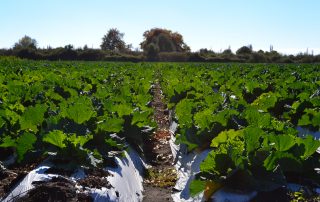BIOMATERIALS DEPARTMENT
RESEARCH LINES
SCOPE OF WORK
The scope of work of the Biomaterials Department is the development of biobased materials. We seek to add value to forest and agricultural biomass by-products, through technologies that impact different industrial sectors of the national economy.
A first line of work is the development of compostable plastic materials to be applied in the packaging, agricultural, forest and commercial sectors. We offer sustainable solutions to companies and final consumers in order to reduce the environmental impact of fossil plastics, due to their slow degradation. The above in a scenario where citizens are increasingly aware of the effect generated by the accumulation of plastics in land and marine environments, and in which new regulations arise restricting their use, both in Chile and abroad. In this context, we develop biodegradable/compostable plastics. Thus, we use thermoplastic starch, polylactic acid (PLA) and cellulose acetate; organic fillers such as algae, cellulose fibers and microfibrils, and different types of additives and compatibilizers. We apply the bioplastics for the manufacture of food packaging (flexible mono and multilayer containers, thermoformed containers), mainly for export fruit; inputs for the agricultural sector (mulch, fasteners and graft holders) and products for trade (bags, injected and blown products).
Another line of interest is the development of materials with active properties, such as antibacterial products with micro/nano copper particles for the medical sector (catheters and cannulas), and packaging with active properties for export fruit allowing food to preserve its quality during transport to destination markets. We have also developed materials with antifungal or low gas permeability properties.
In relation to lignocellulosic materials, we develop technology that allows the use of by-products from the forest and agricultural industry, transforming them into valuable products. Among the raw materials we use, bark, sawdust, spikes and cereal straw stand out. Regarding the conversion processes, we specialize in the fractionation of biomass using solvents, the extraction of secondary metabolites and the production of cellulose nanofibers; and in relation to the final products of interest, natural adhesive resins, industrial additives and thermal insulation panels stand out.
A new line of development is focused on elastomeric materials, in which we value recycled rubber, develop elastomeric products for the construction sector and obtain materials with high resistance to abrasive wear for mining applications.
BIOENERGY DEPARTMENT
RESEARCH LINES
SCOPE OF WORK
Biomass is a renewable source with high potential for the production of chemical compounds, materials and energy. In recent decades, interest in developing technologies that allow efficient and sustainable use of residual biomass has gained worldwide relevance. Efforts have been focused on replacing not very efficient traditional energy use with high environmental impact with more efficient conversion routes that allow obtaining standardized biofuels and intermediate chemicals oriented to the chemical and materials industry, under the concept of biorefineries.
The UDT Bioenergy Department carries out applied research and knowledge generation in thermochemical conversion processes of lignocellulosic biomass, agroindustrial organic waste and other waste, such as post-consumer plastics, out-of-use tires and sludges from water treatment plants. Specifically, we work in processes of fast pyrolysis, intermediate/slow pyrolysis, torrefaction, hydrothermal carbonization, gasification, catalytic systems and co-combustion of biomass and coal. Another area of work of the Bioenergy Department are thermal energy storage systems with phase change materials for heating applications that allow efficient use of solar energy.
In 2018, the Hyb&Car Hybrid and Carbon Materials Group was created, whose objective is to develop nanostructured and multifunctional materials to be applied in clean energy generation, environmental remediation and electrical energy storage. In particular, we work on catalysts based on biomass-derived coals, development of nanoporous carbons for electric supercapacitors, nanostructured and multifunctional hybrid materials for solar cells, and photocatalysts for the production of solar fuels and chemical compounds, among others.
In addition to the research work, the Bioenergy group makes increasing efforts to transfer knowledge and reach the market with R&D technologies and products. In this sense, we have implemented different pilot plants in order to carry out demonstrative tests and publicize the potential of the technologies developed in UDT. Specifically, we built a 20 kg/h slow pyrolysis rotary reactor for the demonstrative production of biochar and bio-oil, we put into operation a demonstrative residual plastic pyrolysis plant for the production of paraffin waxes and diesel fuel, and we implemented a modular CPC photoreactor was built for photocatalytic water treatment.
During the last years, we have made important advances in the scaling of processes, the generation of scientific and technological knowledge, the expansion of our collaboration network with national and international researchers and the strengthening of work with companies and public entities.
TECHNOLOGY MANAGEMENT
Nowadays, companies need to innovate in order to increase their competitiveness in markets that are particularly dynamic. UDT has developed skills that allow us to offer technological solutions to specific problems or needs of companies. Thus, we have our own capacities and knowledge and/or arising from alliances with national and foreign institutions and companies, which allow us to be a strategic partner of the business sector.
In this context, our competencies are oriented to:




















